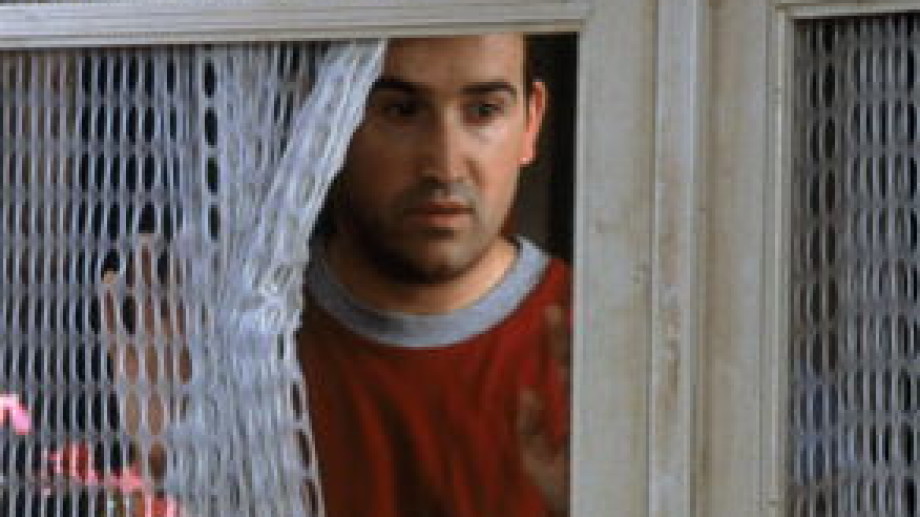
Rosario Flores as Lydia in Pedro Almodóvar’s Talk to Her
To watch a bullfight is to subject oneself to an extreme voyeuristic experience. Such an event produces reactions of the highest intensity. Go with a group, and you’re bound to get a wide range of wholly different responses. Some may find it beautiful and exciting, others shocking and abhorrent. The same could be said for Pedro Almodóvar’s Oscar-winning drama Talk to Her (NYFF '02). But beyond their reactive similarities is a shared concern for the inevitable fate of love and heartbreak, of life and death.
Take the opening scene, in which we are thrust in media res into a performance of Pina Bausch’s Café Müller. Not only is the performance, in which two sleepwalking women saunter about the stage, an immediate connection to the two comatose women around whom the film revolves, but it’s also a parallel study of inevitability. As the slumbering performers move around, a man hastily moves chairs out of their way in an effort to keep them from stumbling. Yet, despite his efforts, they crash into the walls and fall to the ground. The dancers are bound to fall. Benigno and Marco, two men watching the performance who’ve yet to meet, are sitting next to each other and their paths will surely cross. According to Almodóvar, the world is a place in which fates cannot be escaped; strangers will become friends, lovers, and eventually ex-friends and ex-lovers; future hopes will undoubtedly become pains of the past.
Marco and Lydia are products of this outlook. Born in haste, their relationship isn’t celebrated with the usual salad days montage but speedily moved along; in one shot they're casually flirting and, cut to the next scene, they’re holding hands as Lydia shadily tells him they “need to talk.” This conversation, like the relationship itself, is never fully expressed and doesn’t need to be. Its end is as abrupt and certain as its beginning.

Benigno and Alicia's story progresses in a more traditional way, through memories and conversations, but unlike Marco’s relationship, Benigno’s is non-existent—a figment of his own imagination. The memories and conversations are entirely his own. With Marco and Lydia, the inevitability is their relationship’s demise; with Benigno and Alicia, it is the relationship’s consummation. Plunged into the mind of Benigno, we know that after four years his obsession can only end one way. Such a preordained moment, just as with the end of Marco and Lydia, is never explicitly demonstrated because we saw it coming all along.
Stylistically Talk to Her is, as with most Almodóvar films, dazzling but never overwhelmingly so. The film takes on operatic sensibilities at times, as with its opening scene or the beautifully constructed bullfight sequence, in which Marco and Lydia's relationship comes to an abrupt but sadly foreseeable close. As the bull and Lydia prepare for their final meeting, the images slow down and the music swells, the impending brutality is all but certain before the bull even leaves the gate. This scene's narrative counterpoint, Marco and Lydia's first interaction, is also its stylistic antithesis. A casual barroom exchange, the scene is a more subtle presentation of predetermination. After Marco walks up to Lydia and asks to talk to her, she looks away and in a strange, contorted image, we see her reflection looking back at her ex-boyfriend, by whom she's been recently dumped, as he's being told to “forget it. When something's over, it's over.” Marco asks for her attention once more, and the camera snaps back, erasing the other man from the frame.
Thus, despite the film's distinct concern for heartbreak's imminent intrusion on life, there is a sliver of hope. Rising, as the fallen dancers, to amble about the chair-filled stage anew. Hastily moving on, despite rejection, to find another lover, knowing that too will someday end. Entering the arena once more with the knowledge that you might not make it out, Almodóvar's film acknowledges the inevitable and bravely, albeit momentarily, resists it.
Combine tonight's screening of Talk to Her with a meal at Indie Food and Wine in the Elinor Bunin Munroe Film Center with our unbeatable Dinner and a Movie deal for just $25! And make sure to check out the rest of the 50 Years of the New York Film Festival lineup, which ramps up over Labor Day weekend with multiple screenings of Lars von Trier's Dogville (NYFF '03), Jia Zhang-ke's The World (NYFF '04), Cristi Piui's The Death of Mr. Lazarescu (NYFF '05) introduced by former NYFF Selection Committee member Phillip Lopate, Jafar Panahi's Offside (NYFF '06), Carlos Reygadas' Silent Light (NYFF '07), Matteo Garrone's Gomorrah (NYFF '08), Michael Haneke's The White Ribbon (NYFF '09) and Abdellatif Kechiche's Black Venus (NYFF '10)!
Below is a list of all the films that screened alongside Talk to Her at the 40th NYFF:
About Schmidt
Alexander Payne, USA, 2002
Punch-Drunk Love
Paul Thomas Anderson, USA, 2002
Auto Focus
Paul Schrader, USA, 2002
Blind Spot: Hitler's Secretary
André Heller and Othmar Shmiderer, Austria, 2002
Bloody Sunday
Paul Greengrass, UK/Ireland, 2002
Chihwaseon
Im Kwon-taek, South Korea, 2002
Divine Intervention
Elia Suleiman, France/Palestine, 2002
Friday Night (Vendredi soir)
Claire Denis, France, 2002
Love and Diane
Jennifer Dworkin, USA/France, 2002
The Magdalene Sisters
Peter Mullan, Scotland/Ireland, 2002
The Man Without a Past
Aki Kaurismäki, Finland, 2002
Monday Morning
Otar Iosseliani, France/Italy, 2002
My Mother's Smile
Marco Bellocchio, Italy, 2002
Russian Ark
Aleksandr Sokurov, Russia/Germany, 2002
Safe Conduct (Laissez-passer)
Bertrand Tavernier, France, 2002
The Son (Le fils)
Jean-Pierre and Luc Dardenne, Belgium/France, 2002
Springtime in a Small Town
Zhung Ah Cheng, China, 2002
Ten
Abbas Kiarostami, Iran/France, 2002
To Be and to Have
Nicolas Philibert, France, 2002
Turning Gate
Hong Sang-soo, South Korea, 2002
The Uncertainty Principle (O Princípio da Incerteza)
Manoel de Oliveira, Portugal/France, 2002
Unknown Pleasures
Jia Zhang-ke, China/Japan, 2002
Waiting for Happiness (Heremakono)
Abderrahmane Sissako, Mauritania/France, 2002



